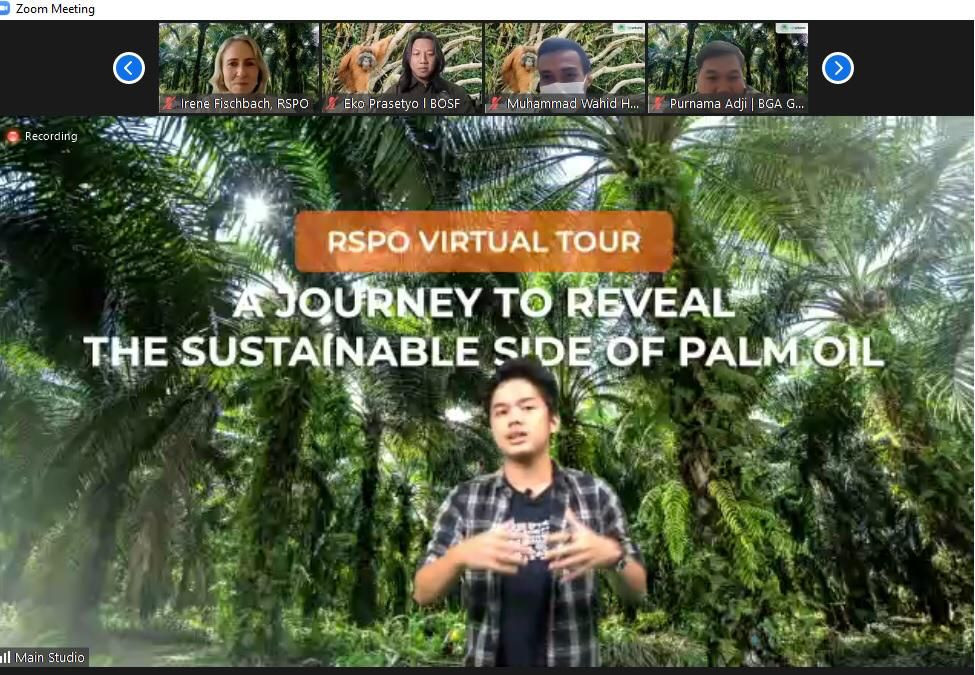Popular Reads
Top Results
Can't find what you're looking for?
View all search resultsPopular Reads
Top Results
Can't find what you're looking for?
View all search resultsRSPO virtual tour reveals sustainable side of palm oil industry
Change text size
Gift Premium Articles
to Anyone
W
hen you think of palm oil, the first thing that probably comes to mind is cooking oil, widely used and especially sought after during these past few months.
However, palm oil is used in more things than you might expect -- it is found in the food you eat, the cosmetics you use and the biodiesel you put in your car. Given its ubiquity, it comes as no surprise that palm oil is widely used as a raw material in various industries.
Unfortunately, the palm oil industry, up to this day, is still perceived negatively by various parties, including national and international environmental groups, governments from various countries, as well as consumers of palm oil products and their derivatives.
This fact is due to the number of palm oil industry players who run their business poorly or do not follow sustainability principles, painting the entire industry as the cause of forest and land fires, flora and fauna extinction and land conflicts.
However, a number of palm oil industry players have begun to show a commitment to changing their business practices and embracing sustainability principles, reflected in the large number of palm oil companies joining the Roundtable on Sustainable Palm Oil (RSPO) as full-fledged members.
To dispel various misconceptions about the palm oil industry and highlight the industry’s commitment to sustainability, the RSPO collaborated with Bumitama Gunajaya Agro (BGA), Sawit Sumbermas Sarana (SSMS), Borneo Orangutan Foundation (BOSF) and Youth in Sustainability (YiS) to hold a virtual tour to explore palm oil plantations and orangutan conservation areas managed on a sustainable basis by RSPO members in Indonesia.
Conducted via Zoom on April 22 to coincide with Earth Day, the virtual tour acts as a substitute for the annual field visits to palm oil plantations and conservation areas organized by RSPO. The program aims to introduce and promote the value of sustainable palm oil that supports environmental sustainability.
RSPO director of stakeholder engagement and communications Irene Fischbach said in her opening address that since its founding in 2004, RSPO now counts more than 5,000 members worldwide.
“With 11.40 million tons of certified sustainable palm oil (CSPO per year), Indonesia is the largest producer of CSPO, contributing to almost 60 percent of the world's CSPO availability,” she explained.
As of July 2021, there were 452 RSPO-certified mills globally, with 50.66 in Indonesia alone. Approximately 60 palm oil plantation companies in Indonesia have been registered as RSPO members, are ready to practice sustainable palm oil principles and preserve the environment around their management areas.
According to Fischbach, palm is the most sustainable vegetable oil crop, meeting 40 percent of the global demand while occupying significantly less land than that used to produce other vegetable oils.
“Not only does it play an important role in our daily lives, but it is crucial to ensuring food security for a growing population, even more so in the context of the current crisis.”
Meanwhile, RSPO senior manager assurance Indonesia Djaka Riksanto highlighted the significance of the Indonesian palm oil industry, noting that the industry employs 8.4 million workers nationally.
“One thing not many people might know is that palm oil is not only used for cooking -- approximately half of the average supermarket stock products contain palm oil, from food to cosmetics and cleaning products,” he said.
According to data presented by Statista, global consumption of palm oil reached 73.215 million tons in 2020/2021. Meanwhile, the Indonesian Palm Oil Association (GAPKI) estimated that in 2020, domestic consumption of palm oil products reached approximately 17.35 million tons, with exports at 34 million tons.
With the negative publicity surrounding the palm oil industry, some have issued calls to switch to other vegetable oils, such as sunflower oil, soybean or rapeseed. However, Djaka said that going down this path will lead to further issues down the line.
“In fact, palm oil is one of the most productive vegetable oils, since it uses the least amount of land, compared to other oils, while also being affordable. For instance, it takes 0.26 hectares of land to produce one ton of palm oil, whereas sunflower oil requires 1.43 hectares per ton --more than five times more land area is required,” he said, adding that soybean oil requires two hectares of land per ton.
“What this means is that if we were to completely replace palm oil as a crop, we would need four to ten times the area of land to produce the same amount of oil.”
Djaka acknowledged some of the negative publicity surrounding palm oil plantations, such as land clearing and conflicts with local communities, which arise from irresponsible companies.
“What we need right now is a solution or middle ground for palm oil to be managed responsibly so as to reduce the negative impacts, one of which is through sustainable palm oil. This concept is what RSPO encourages industry players to apply in their operations,” he concluded.










